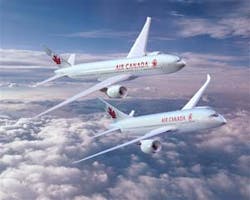Air Canada Spends $6 Billion to Improve its Fleet With Boeing Aircraft
The agreement includes firm orders for 18 777s and 14 787s - Boeing's newest jet, the Dreamliner. Air Canada, which emerged from bankruptcy protection in Octber, has options and purchase rights for 46 more 787s and 18 more 777s.
Robert Milton, chairman and CEO of ACE Aviation Holdings, the Montreal-based parent company of Air Canada said the new fleet would save the company hundreds of millions of dollars by lowering its fuel costs and eliminating the need to upgrade its current wide-bodies, which are more than 20 years old, on average.
''I am confident no one has ever done better on a deal,'' said Milton, who intends to dedicate the aircraft primarily to flights between Canada and various destinations in Asia, including Beijing, Shanghai and New Delhi.
Milton said the company also plans to boost its international cargo service, eliminating costly stopovers in Alaska.
''They're trying to reinvent themsevles,'' said Richard Aboulafia, an aviation analyst with the Teal Group in Farifax, Va. ''If you're striving for the best, this is how you would do it.''
Boeing Co. valued the firm orders at about $6 billion at list prices and said it would be the largest deal so far for its new Dreamliner model, assuming Air Canada buys all 60.
The 787 Dreamliner, which seats between 217 and 289 passengers, is scheduled to debut in 2008.
Air Canada said the bulk of the financing would be guaranteed by the Export Import Bank of the United States, in Canadian dollars. The airliner also recently secured $642 million in U.S. financing and officials said they had negotiated a ''progressive payment schedule'' so that Air Canada would not be forced to put all the cash for the deal up front.
Aboulafia said the backing of the U.S. government-run bank clearly helped one of its own: Boeing. ''It's one of those little things that government do to help industry everywhere,'' he said. ''It's all very mutually enabling.''
As part of its restructuring, Air Canada cut roughly $2 billion ($1.6 billion) a year in operating costs, half of that in concessions from employees, which has led to strikes and poor morale among employees.
Milton said the plan for expanding in Asian and European markets is estimated to bring in an additional $300 million of improved annual profitability by 2010. And he said the company would save $5 million per aircraft on upgrades once designated for the older jets.
Air Canada did not say why it opted for the Boeing rather than rival Airbus for its investor-demanded fleet renewal. Milton noted that Air Canada would continue to use the Airbus for its narrow-body fleet and that the company has one of the world's largest Airbus fleets.
He praised the sleek design and fuel efficiency of the two-engine Boeing models.
''When you look at the future of fuel costs, it can be a pretty scary picture,'' Milton said. ''Our analysis of these aircraft pointed to overwhelmingly attractive economics. We have estimated the fuel burn and maintenance cost savings alone on the 787 to be approximately 30 percent versus the (Boeing) 767s they will replace.''
Deliveries of the new planes will begin in 2007 and extend through 2009.
Also Monday, Boeing announced an order from Copa Airlines of Panama for five 737 twinjets and options for 10 more. If all 15 planes are purchased, the deal would be worth approximately $750 million, Boeing and Copa said. Deliveries of the new planes will begin in 2007 and extend through 2009.
In midday trading Monday, Boeing shares rose $1.50, or 2.6 percent, to $59.38 on the New York Stock Exchange. The stock has traded in a 52-week range of $40.31 to $59.81.
